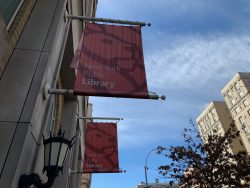With notes collected from Eric Klinenberg’s November talk at the Heyman Center for the Humanities, Staff Writer Andrew Wang argues that libraries—specifically public libraries—are worth our consideration.
In 1995, temperatures in Chicago soared. The city was utterly unprepared, and 739 lives were lost.
In 2002, the sociologist Eric Klinenberg would study why the heat wave caused so much damage. He found that the most vulnerable neighborhoods were low-income, predominantly African-American ones. But that wasn’t the end of it. There were these two neighborhoods that were side by side. On paper they looked the same: race, check, socioeconomic status, check.
One neighborhood’s death toll was ten times greater.
Klinenberg described what is now commonly known as “social infrastructure,” or the shared public spaces that predict the health of a community. In the healthier neighborhood, places like churches and open storefronts encouraged people to move around and meet. So when the heat wave struck, people checked up on others whom they knew. In the other neighborhood—littered with empty lots and abandoned buildings—residents were used to staying in homes that quickly became inhabitable.
The concept of social infrastructure is crucial to understanding what makes a community. Last year, Klinenberg published Palaces for the People, which tackles the question of whether libraries are obsolete in today’s digitalized age when we can get almost everything online. If social infrastructure still matters, then the answer is no.
The Columbia student is no stranger to the library. For me, I have spent more nights in Butler than I would like to admit. After coming to Columbia as a transfer student last year, I thought there was nothing that screamed “Columbia” like being confined to a chair in 301, surrounded by books and chandeliers and quiet. Studying in Butler became a frequent ritual—a proof, as it were—that I belonged here. Yet, I find that I still hesitate to call Butler my home.
I spend less time there now, but to be honest, I either study in Butler or I don’t study at all. But wait! One block away from my dorm on 114th and Broadway is the Morningside Heights library. Until this article, I had never stepped foot in it.
Why not? Perhaps I had refused. Or I had internalized the idea the Columbia’s libraries must be superior in every way; after all, it’s for the select few, right? Why go to the public library when there’s Butler?
The answer is that there are differences between Butler and the library on 113th. For one, Butler’s Yelp rating is 4.5; the public library’s is 3.0. Some negative reviews for the public library include it being a “pseudo-infant daycare center” and a place for too many homeless people. But let’s break down what they’re saying. Really, our Yelp reviewers are crying out, “Social infrastructure! Social infrastructure!” Our astute observers demonstrate a profound understanding that libraries function beyond the purpose of providing books. Even if it’s a million books. A billion books.
Actually, as of this very moment, the public library’s rating just shot up to 3.1. That’s because I gave it 5 stars with the rather ominous comment, “A book cannot hold without its spine; a community cannot last without its social bonds.”
Anyways, if you’re still with me, I hope you’ll consider getting a public library card. To get one, all you have to do is visit this site and fill out the application form. Where it asks for your address, put down the Columbia address listed on your housing portal. It takes less than a minute. Then, just go to the library with an ID to pick up your card—the nearest one is on 113th and Broadway. Afterwards, you get access to any public library in the city. There are 92 of them.
According to the NYPL website, a card lets you “borrow library materials, reserve a computer, download digital media, search hundreds of electronic databases, and more.” For those times when Columbia’s books are checked out, its computers occupied, that library two minutes from Butler might not be a bad idea.
But the “and more” is key, and the main reason why I’ve written this. As Klinenberg argues, libraries aren’t just places to get books. They’re places for social companionship and experimental learning, open to the community regardless of age or salary or SAT score. They speak to the genuine, universal constitution of our city.
As for me, I believe I still have much to learn from what public libraries can offer. And I accept that the sense of community I’ve been looking for might have been under my nose this whole time.
Photo via Andrew Wang


 1 Comments
1 Comments

1 Comment
@Anonymous Google should provide free wimax for all New Yorkers in exchange for all their tax incentives.